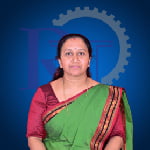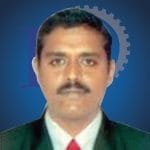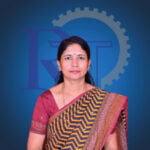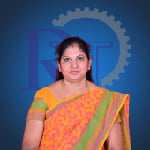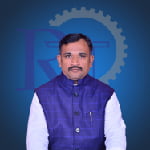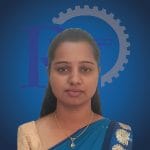
Department of Basic Science and Humanities
About the Department
Department of Physics
About the Department
The Department of Physics was established in 2008. Over the period, the Department has been nurtured to be one of the best departments. The Department of Physics teaches and promotes practical aspects of science to build a solid foundation as part of the Engineering Education. The Department of Physics has teaching programme at graduation level to all engineering programs in semester I and II. The department has well qualified and experienced faculty, best infrastructure and is well equipped with latest experimental setup to provide good theoretical and practical knowledge in physics.
HOD’s MESSAGE

Dr. Chandana S N
Head of the Department
“Engineering physics department is one of the basic science departments. It is an amalgamation of physics, mathematics and electrical engineering courses. The program emphasizes on making students familiar with basic knowledge of physics along with a good background in engineering disciplines. The aim of the department is imparting the required fundamental knowledge to students in their undergraduate programs.”
VISION
- To enable fresh minds to acquire fundamental insights into basic science which contribute to intellectually vibrant individuals for the welfare of the society.
MISSION
- To enhance the students’ knowledge, ability in the study of physics by igniting and nurturing enthusiasm and passion in professional courses.
- To facilitate awareness of the impact of chemical attributes on our environment and society.
- To provide the students with a strong Mathematical foundation which meets the requirement in the field of industry, research and higher education.
- To provide a strong base in applied sciences to the students of engineering and technology, thereby forming a basis to all technical sciences.
Program Outcomes as defined by NBA (PO)
Engineering Graduates will be able to:
- Engineering knowledge: Apply the knowledge of mathematics, science, engineering fundamentals, and an engineering specialization to the solution of complex engineering problems.
- Problem analysis: Identify, formulate, review research literature, and analyze complex engineering problems reaching substantiated conclusions using first principles of mathematics, natural sciences, and engineering sciences.
- Design/development of solutions: Design solutions for complex engineering problems and design system components or processes that meet the specified needs with appropriate consideration for the public health and safety, and the cultural, societal, and environmental considerations.
- Conduct investigations of complex problems: Use research-based knowledge and research methods including design of experiments, analysis and interpretation of data, and synthesis of the information to provide valid conclusions.
- Modern tool usage: Create, select, and apply appropriate techniques, resources, and modern engineering and IT tools including prediction and modeling to complex engineering activities with an understanding of the limitations.
- The engineer and society: Apply reasoning informed by the contextual knowledge to assess societal, health, safety, legal and cultural issues and the consequent responsibilities relevant to the professional engineering practice.
- Environment and sustainability: Understand the impact of the professional engineering solutions in societal and environmental contexts, and demonstrate the knowledge of, and need for sustainable development.
- Ethics: Apply ethical principles and commit to professional ethics and responsibilities and norms of the engineering practice.
- Individual and team work: Function effectively as an individual, and as a member or leader in diverse teams, and in multidisciplinary settings.
- Communication: Communicate effectively on complex engineering activities with the engineering community and with society at large, such as, being able to comprehend and write effective reports and design documentation, make effective presentations, and give and receive clear instructions.
- Project management and finance: Demonstrate knowledge and understanding of the engineering and management principles and apply these to one’s own work, as a member and leader in a team, to manage projects and in multidisciplinary environments.
- Life-long learning: Recognize the need for, and have the preparation and ability to engage in independent and life-long learning in the broadest context of technological change.
Short-term objectives
- To provide high-quality education in the humanities, engineering sciences, and basic sciences
- To optimize results by adopting best teaching practices.
Long-Term objectives
To plan educational initiatives in physics, engineering, and technology.
Class In charge Details
| Year | In charge Name | Mail id |
|---|---|---|
| 1st year A section | Dr. Ganesha D P | ganeshaphy@rithassan.ac.in |
| 1st year B section | Dr. Sahana C P | sahanaphy@rithassan.ac.in |
| 1st year C section | Mrs. Brunda H | brundha@rithassan.ac.in |
| 1st year D section | Mrs. Somashekar M | somashekharmaths@rithassan.ac.in |
| 1st year E section | Mrs. Dhanalakshmi B | dhanb2010@rithassan.ac.in |
| 1st year F section | Mr. Santhosh kumar B | santhoshbbmaths@rithassan.ac.in |
Department of Chemistry
About the Department
The Department of Chemistry at RIT came into existence in the year 2008 during the inception of the institution. The Department teaches Engineering Chemistry and courses for I and II semester B. E. students, irrespective of the streams. The department has well established laboratory with good infrastructure. Chemistry department has well qualified, experienced and highly motivated faculty members who are actively involved in teaching basic applications of science in engineering. With these, the department has been consistently achieving good results in the University exams.
HOD’s MESSAGE
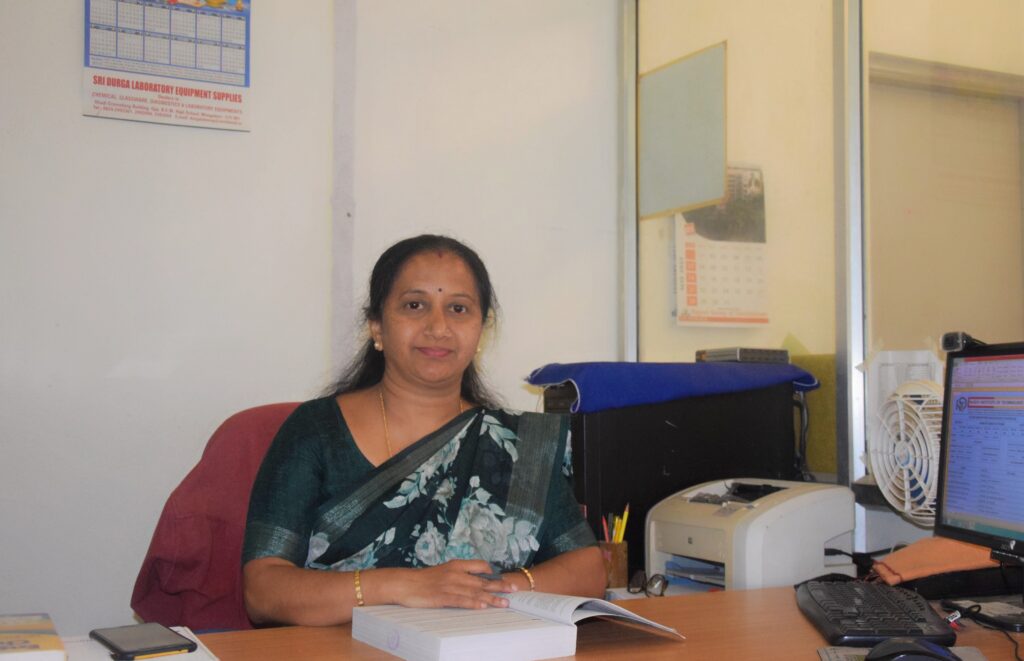
Mrs. Veena K P
Head of the Department
“Engineering Chemistry is a bridge that connects Pure Science with engineering practices. It aims at providing a strong foundation for students of engineering and is one of the indispensable departments of the Institute.
The Department of Chemistry teaches and promotes practical aspects of science to build a solid foundation as part of the Engineering Education. The Chemistry Department has facilities for conducting micro analytical work, chemical investigation of materials including analysis of ores and alloys. Instruments like, pH meter, Conductivity meter, Colorimeter, Spectrophotometer etc.”
VISION
- To enable fresh minds to acquire fundamental insights into basic science which contribute to intellectually vibrant individuals for the welfare of the society.
MISSION
- To enhance the students’ knowledge, ability in the study of physics by igniting and nurturing enthusiasm and passion in professional courses.
- To facilitate awareness of the impact of chemical attributes on our environment and society.
- To provide the students with a strong Mathematical foundation which meets the requirement in the field of industry, research and higher education.
- To provide a strong base in applied sciences to the students of engineering and technology, thereby forming a basis to all technical sciences.
Program Outcomes as defined by NBA (PO)
Engineering Graduates will be able to:
- Engineering knowledge: Apply the knowledge of mathematics, science, engineering fundamentals, and an engineering specialization to the solution of complex engineering problems.
- Problem analysis: Identify, formulate, review research literature, and analyze complex engineering problems reaching substantiated conclusions using first principles of mathematics, natural sciences, and engineering sciences.
- Design/development of solutions: Design solutions for complex engineering problems and design system components or processes that meet the specified needs with appropriate consideration for the public health and safety, and the cultural, societal, and environmental considerations.
- Conduct investigations of complex problems: Use research-based knowledge and research methods including design of experiments, analysis and interpretation of data, and synthesis of the information to provide valid conclusions.
- Modern tool usage: Create, select, and apply appropriate techniques, resources, and modern engineering and IT tools including prediction and modeling to complex engineering activities with an understanding of the limitations.
- The engineer and society: Apply reasoning informed by the contextual knowledge to assess societal, health, safety, legal and cultural issues and the consequent responsibilities relevant to the professional engineering practice.
- Environment and sustainability: Understand the impact of the professional engineering solutions in societal and environmental contexts, and demonstrate the knowledge of, and need for sustainable development.
- Ethics: Apply ethical principles and commit to professional ethics and responsibilities and norms of the engineering practice.
- Individual and team work: Function effectively as an individual, and as a member or leader in diverse teams, and in multidisciplinary settings.
- Communication: Communicate effectively on complex engineering activities with the engineering community and with society at large, such as, being able to comprehend and write effective reports and design documentation, make effective presentations, and give and receive clear instructions.
- Project management and finance: Demonstrate knowledge and understanding of the engineering and management principles and apply these to one’s own work, as a member and leader in a team, to manage projects and in multidisciplinary environments.
- Life-long learning: Recognize the need for, and have the preparation and ability to engage in independent and life-long learning in the broadest context of technological change.
Program Specific Outcomes
- The ability to demonstrate the understanding of the basic principles, laws, theories, axioms and problem solving skills of basic sciences and their application in engineering and technology.
- The ability to apply the basic knowledge to design and to develop the engineering concepts using the modern tools to contribute to society.
- The ability to apply the knowledge of constitution, ethics and environmental awareness effectively and efficiently in engineering.
Short-term objectives
- The department uses innovative and original teaching strategies to raise student academic performance. putting on programmes to help people learn new things and develop their abilities, etc.
Long-Term objectives
- The fundamental goal of the Department of Chemistry is to educate the future generation of graduates who are capable of providing leadership that can result in the economic and social change of students as well as the ability to solve real-world challenges.
Class In charge Details
| Year | In charge Name | Mail id |
|---|---|---|
| 1st year A section | Dr. Ganesha D P | ganeshaphy@rithassan.ac.in |
| 1st year B section | Dr. Sahana C P | sahanaphy@rithassan.ac.in |
| 1st year C section | Mrs. Brunda H | brundha@rithassan.ac.in |
| 1st year D section | Mrs. Somashekar M | somashekharmaths@rithassan.ac.in |
| 1st year E section | Mrs. Dhanalakshmi B | dhanb2010@rithassan.ac.in |
| 1st year F section | Mr. Santhosh kumar B | santhoshbbmaths@rithassan.ac.in |
Department of Mathematics
About the Department
The Department of mathematics was established in the year 2008. The Department has well qualified experienced and dedicated faculty and offers programs for both graduate and Post graduate students. The Engineering Mathematics has wide application and skills applicable to multi disciplinary technology in a balanced, integrated engineering curriculum.
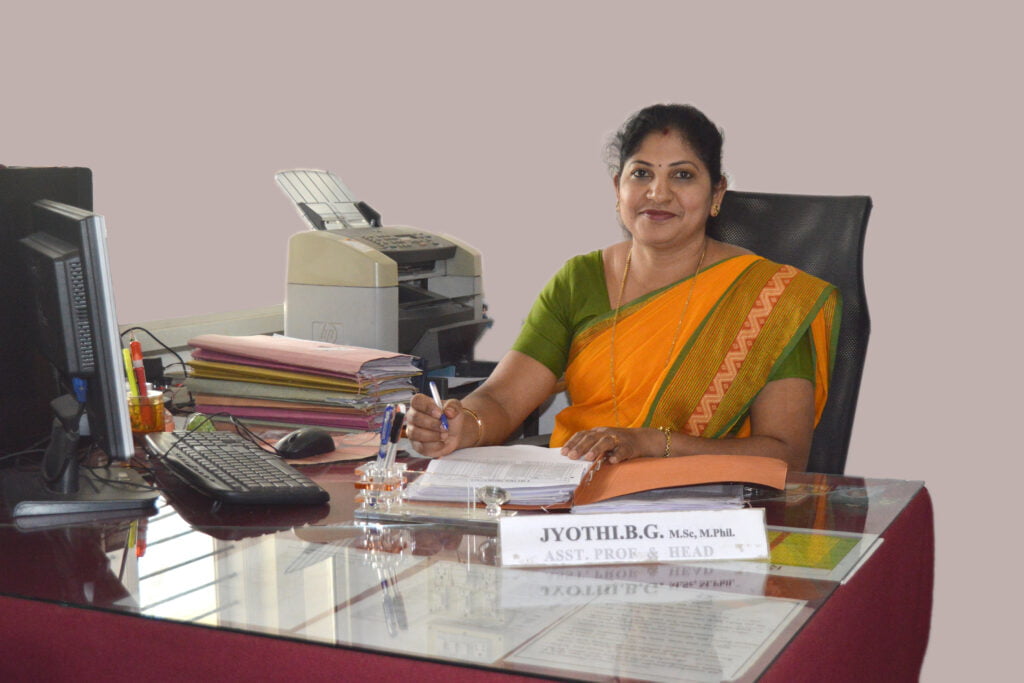
Mrs. Jyothi B G
Head of the Department
VISION
- To enable fresh minds to acquire fundamental insights into basic science which contribute to intellectually vibrant individuals for the welfare of the society.
MISSION
- To enhance the students’ knowledge, ability in the study of physics by igniting and nurturing enthusiasm and passion in professional courses.
- To facilitate awareness of the impact of chemical attributes on our environment and society.
- To provide the students with a strong Mathematical foundation which meets the requirement in the field of industry, research and higher education.
- To provide a strong base in applied sciences to the students of engineering and technology, thereby forming a basis to all technical sciences.
Program Outcomes as defined by NBA (PO)
Engineering Graduates will be able to:
- Engineering knowledge: Apply the knowledge of mathematics, science, engineering fundamentals, and an engineering specialization to the solution of complex engineering problems.
- Problem analysis: Identify, formulate, review research literature, and analyze complex engineering problems reaching substantiated conclusions using first principles of mathematics, natural sciences, and engineering sciences.
- Design/development of solutions: Design solutions for complex engineering problems and design system components or processes that meet the specified needs with appropriate consideration for the public health and safety, and the cultural, societal, and environmental considerations.
- Conduct investigations of complex problems: Use research-based knowledge and research methods including design of experiments, analysis and interpretation of data, and synthesis of the information to provide valid conclusions.
- Modern tool usage: Create, select, and apply appropriate techniques, resources, and modern engineering and IT tools including prediction and modeling to complex engineering activities with an understanding of the limitations.
- The engineer and society: Apply reasoning informed by the contextual knowledge to assess societal, health, safety, legal and cultural issues and the consequent responsibilities relevant to the professional engineering practice.
- Environment and sustainability: Understand the impact of the professional engineering solutions in societal and environmental contexts, and demonstrate the knowledge of, and need for sustainable development.
- Ethics: Apply ethical principles and commit to professional ethics and responsibilities and norms of the engineering practice.
- Individual and team work: Function effectively as an individual, and as a member or leader in diverse teams, and in multidisciplinary settings.
- Communication: Communicate effectively on complex engineering activities with the engineering community and with society at large, such as, being able to comprehend and write effective reports and design documentation, make effective presentations, and give and receive clear instructions.
- Project management and finance: Demonstrate knowledge and understanding of the engineering and management principles and apply these to one’s own work, as a member and leader in a team, to manage projects and in multidisciplinary environments.
- Life-long learning: Recognize the need for, and have the preparation and ability to engage in independent and life-long learning in the broadest context of technological change.
Program Specific Outcomes
- The ability to demonstrate the understanding of the basic principles, laws, theories, axioms and problem-solving skills of basic sciences and their application in engineering and technology.
- The ability to apply the basic knowledge to design and to develop the engineering concepts using the modern tools to contribute to society.
- The ability to apply the knowledge of constitution, ethics and environmental awareness effectively and efficiently in engineering.
INFRASTRUCTURE
Department of Physics
Engineering Physics Laboratory
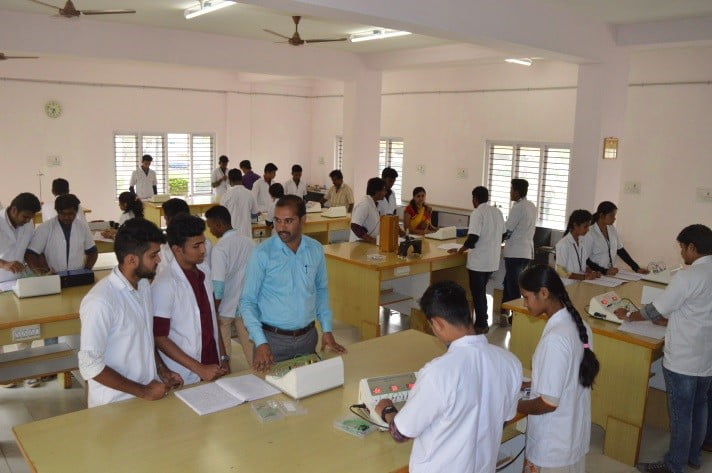
Features
- Well-equipped and spacious as per the norms
- High-quality tools and resources
- Well-designed working tables.
- Adequate safety precautions
- Uninterrupted Power Supply assistance.
Major Equipment’s
- Optical fiber experiment setup
- Springs in series and parallel
- Black-Body Radiator
- Function Generators (Audio Frequency Oscillators)
- Traveling Microscope ( Two motion and Single Motion)
- Diode Laser
- Optical Gratings
- Spectrometer
- Torsional Pendulum
- Single Cantilever
Department of Chemistry
Engineering Chemistry Laboratory
Infrastructure/Facilities
The Department of Chemistry was founded in 2008 and has an excellent infrastructure. Its working space is 225 sq.m. and includes a large laboratory, the chamber for the department head, a staff room, a storeroom, and computer and internet access. The department is equipped with all the tools, glassware, chemicals, and reagents necessary to carry out experiments in accordance with the university curriculum. The lab is connected to a water supply and UPS to ensure that practical’s run smoothly. With a fire extinguisher, safety measure display boards, and a first aid kit, the department has placed more of an emphasis on safety precautions.
Department Library
The library is equipped with more than 150 text & reference books for students & staffs.
Laboratory with UPS support
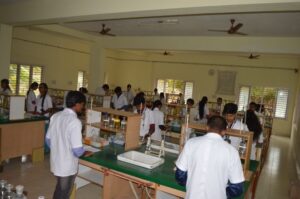
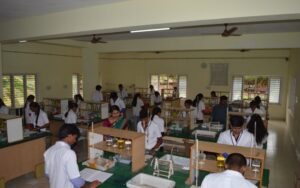
Major Equipment of Laboratories
| Sl. No. | EQUIPMENT NAME |
| 1 | pH METER |
| 2 | POTENTIOMETER |
| 3 | CONDUCTOMETER |
| 4 | COLORIMETER |
| 5 | MAGNETIC STIRRER |
| 6 | DISTILLED WATER PLANT |
| 7 | HOT AIR OVEN |
| 8 | DE IONISATION PLANT |
Facilities Provided:
The department is well equipped with instruments required to carry out Engineering chemistry lab as well as research in core chemistry.
Facilities for Students:
- Stocked Reference Books.
- Stocked Text Books
- Support for Student Projects
Facilities for Faculty:
- Well Stocked Department Library
- Internet Facility with WIFI connectivity
Department of Mathematics
Engineering Mathematics Laboratory
Infrastructure and Facilities
The Mathematics laboratory was founded in 2022 and has an excellent infrastructure. Its working space is 119 sq.m. and includes a large laboratory, the chamber for the department head, a staff room, and computer and internet access. The department is equipped with all the tools, carry out programs in accordance with the university curriculum. With a fire extinguisher, safety measure display boards, and a first aid kit, the department has placed more of an emphasis on safety precautions.
Major Equipment and software tools available in laboratories
Hardware Tool
Dell Desktop 17 inch LCD Monitor, Dell Optiplex 9010 Intel(R) Core(TM) i3-3220 CPU @3.30 GHz, 4 GB RAM, 250r GB SATA HDD.
Software Tools
- OS: Windows
- Software: Anaconda, PYTHON
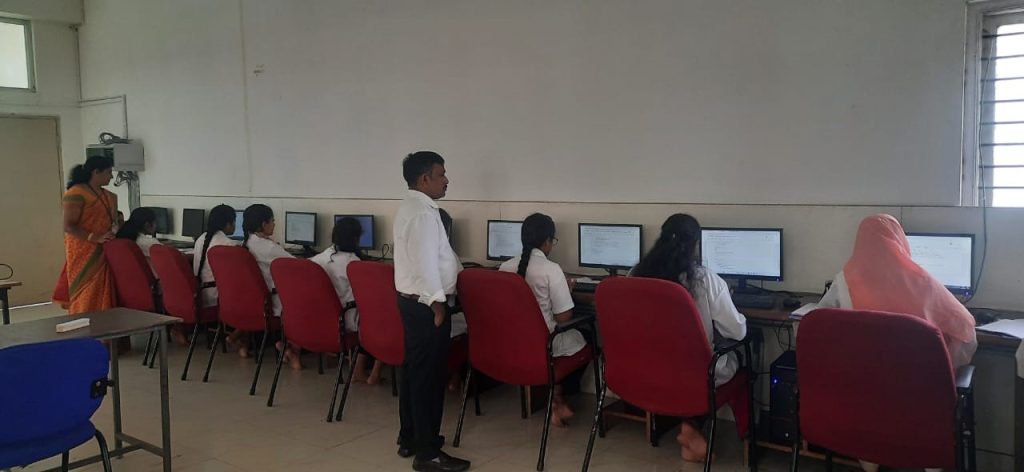
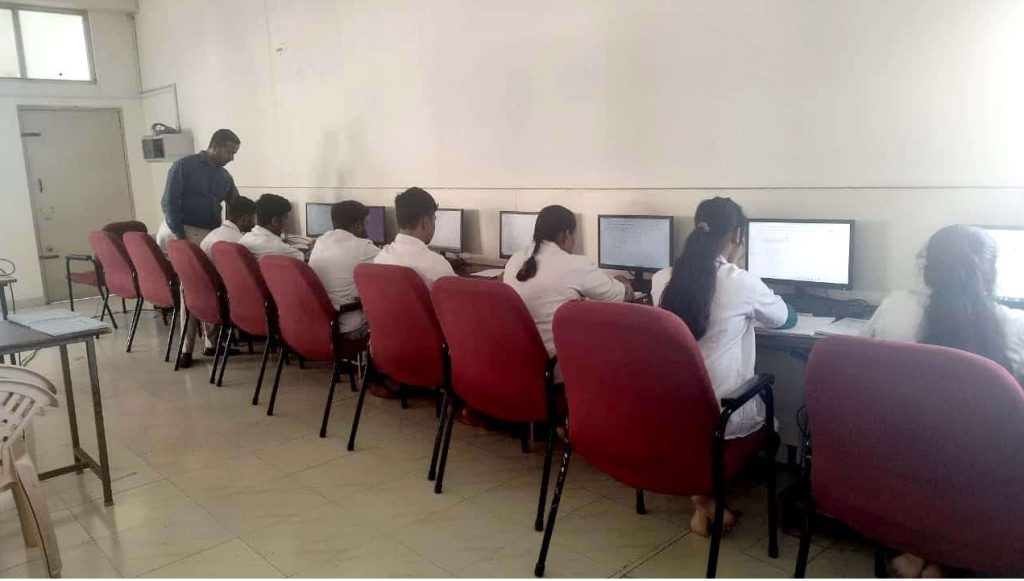
Facilities Provided
The department is well equipped with instruments required to carry out Engineering Mathematics lab .
Faculty Profiles
Department of Physics
Teaching Staff Details
Department of Chemistry
Teaching Staff Details
Department of Humanities
Teaching Staff Details
Student Learning Centric Odd Semester details(2022-2023)
| Sl. No. | Subject Name | Subject Code | Faculty Name | Course Modules | Lesson plan | Notes of lessons | PPT | Laboratory Manual | Lab Videos | |||
|---|---|---|---|---|---|---|---|---|---|---|---|---|
| 1 | Mathematics for CSE stream | BMATS101 | Mrs. Jyothi B G | Link | ||||||||
| 2 | Mathematics for CSE stream | BMATS201 | Mr. Somashekar M | Link | Link | |||||||
| 3 | Mathematics for EEE stream | BMATE101 | Mr. Santosh B B | Link | ||||||||
| 4 | Mathematics for EEE stream | BMATE201 | Mrs. Brunda H | Link | Link | |||||||
| 5 | Mathematics for ME/CV stream | BMATM101 | Mr. Somashekar M | Link | ||||||||
| 6 | Mathematics for ME/CV stream | BMATM201 | Mr. Santosh B B | Link | ||||||||
| 7 | Chemistry for CSE stream | BCHES202 | Mrs. Veena K P | Link | ||||||||
| 8 | Chemistry for EEE stream | BCHEE202 | Mrs. Dhanalakshmi B | |||||||||
| 9 | Chemistry for CV stream | BCHEC102 | Mrs. Dhanalakshmi B | |||||||||
| 10 | Chemistry for ME stream | BCHEM102 | Mrs. Veena K P | |||||||||
| 11 | Computer Aided Engineering Drawing | BCEDK203 | Mr. Vinay L, Mr. Dharanesh O H | Link | ||||||||
| 12 | Introduction to Electronics Communication | BESC104/204C | Mrs. Lokeshwari H S, Mr.Vishwanath B R | Link | ||||||||
| 13 | Introduction to C Programming | BESC204E | Mrs. Kannika | Link | Link | |||||||
| 14 | Introduction to Python Programming | BPLC205B | Ms.Sahana R S/ Mrs. Kannika | Link | Link | |||||||
| 15 | Professional writing skills in English | BPWSK106/206 | Mr. Anirudha | Link | Link | |||||||
| 16 | Indian Constitution | BICOK207 | Mrs. Manu K B | |||||||||
| 17 | Innovation and Design Thinking | BIDTK258 | Mr. Anirudha, Mrs.Dhanalakshmi B. | Link | Link | |||||||
| 18 | Physics for CSE stream | BPHYS102/202 | Dr. Ganesh D P, Dr. Sahana C P | Link | ||||||||
| 19 | Physics for Civil stream | BPHYC202 | Dr. Chandana S N | |||||||||
| 20 | Physics for Mechanical stream | BPHYM202 | Dr. Chandana S N | |||||||||
| 21 | Physics for Electrical stream | BPHYE102 | Dr. Chandana S N | |||||||||
| 22 | Basic Electronics | BBEE103/203 | ||||||||||
| 23 | Basic Electrical Engineering | BEEE103/204 | ||||||||||
| 24 | Elements of Mechanical Engineering | BEMEM203 | Mr.Pavankumar K K | |||||||||
| 25 | Principles of Programming using C | BPOP203 | Mrs. Swetha B R/ Madhuri | Link | Link | |||||||
| 26 | Engineering Science Course – I ( Intro to Civil Engg.) | BESCK204A | Mrs.Madhu K M | Link | ||||||||
| 27 | Engineering Science Course – I ( Intro to Mech Engg.) | BESCK244 | Mr. Dharanesh O H | |||||||||
| 28 | Emerging Technology Course -I (Renewable Energy Sources) | BETCK205E | Dr.Sahana C P, Dr. Ganesh D P | Link | ||||||||
| 29 | Communicative English | BENGK106 | Mr. Anirudha | Link | Link |
Student Learning Centric details(2022-2023)
| Sl. No. | Subject Name | Subject Code | Faculty Name | Course Modules | Lesson plan | Notes of lessons | PPT | Laboratory Manual | Lab Videos |
| 1 | 2 | 3 | 4 | 5 | 6 | ||||
| 1 | Mathematics for CSE stream | BMATS101 | Mrs. Jyothi B G | Link | Link | Link | Link | ||
| 2 | Mathematics for CSE stream | BMATS201 | Mr. Somashekar M | Link | Link | Link | Link | ||
| 3 | Mathematics for EEE stream | BMATE101 | Mr. Santosh B B | Link | Link | Link | Link | ||
| 4 | Mathematics for EEE stream | BMATE201 | Mrs. Brunda H | Link | Link | Link | Link | ||
| 5 | Mathematics for ME/CV stream | BMATM101 | Mr. Somashekar M | Link | Link | Link | |||
| 6 | Mathematics for ME/CV stream | BMATM201 | Mr. Santosh B B | Link | |||||
| 7 | Chemistry for CSE stream | BCHES202 | Mrs. Veena K P | Link | Link | Link | Link | ||
| 8 | Chemistry for EEE stream | BCHEE202 | Mrs. Dhanalakshmi B | Link | Link | Link | |||
| 9 | Chemistry for CV stream | BCHEC102 | Mrs. Dhanalakshmi B | Link | Link | Link | Link | ||
| 10 | Chemistry for ME stream | BCHEM102 | Mrs. Veena K P | Link | Link | Link | Link | ||
| 11 | Computer Aided Engineering Drawing | BCEDK203 | Mr. Vinay L, Mr. Dharanesh O H | Link | Link | ||||
| 12 | Introduction to Electronics Communication | BESC104/204C | Mrs. Lokeshwari H S, Mr.Vishwanath B R | Link | Link | Link | |||
| 13 | Introduction to C Programming | BESC204E | Mrs. Kannika | Link | Link | Link | Link | ||
| 14 | Introduction to Python Programming | BPLC205B | Ms.Sahana R S/ Mrs. Kannika | Link | Link | Link | Link | ||
| 15 | Professional writing skills in English | BPWSK106/206 | Mr. Anirudha | Link | Link | Link | Link | ||
| 16 | Indian Constitution | BICOK207 | Mrs. Manu K B | ||||||
| 17 | Innovation and Design Thinking | BIDTK258 | Mr. Anirudha, Mrs.Dhanalakshmi B. | Link | Link | Link | Link | ||
| 18 | Physics for CSE stream | BPHYS102/202 | Dr. Ganesh D P, Dr. Sahana C P | Link | Link | Link | |||
| 19 | Physics for Civil stream | BPHYC202 | Dr. Chandana S N | ||||||
| 20 | Physics for Mechanical stream | BPHYM202 | Dr. Chandana S N | ||||||
| 21 | Physics for Electrical stream | BPHYE102 | Dr. Chandana S N | ||||||
| 22 | Basic Electronics | BBEE103/203 | |||||||
| 23 | Basic Electrical Engineering | BEEE103/204 | |||||||
| 24 | Elements of Mechanical Engineering | BEMEM203 | Mr.Pavankumar K K | Link | |||||
| 25 | Principles of Programming using C | BPOP203 | Mrs. Swetha B R/ Madhuri | Link | Link | Link | Link | ||
| 26 | Engineering Science Course – I ( Intro to Civil Engg.) | BESCK204A | Mrs.Madhu K M | Link | Link | Link | |||
| 27 | Engineering Science Course – I ( Intro to Mech Engg.) | BESCK244 | Mr. Dharanesh O H | Link | |||||
| 28 | Emerging Technology Course -I (Renewable Energy Sources) | BETCK205E | Dr.Sahana C P, Dr. Ganesh D P | Link | Link | Link | |||
| 29 | Communicative English | BENGK106 | Mr. Anirudha | Link | Link | Link | Link |






